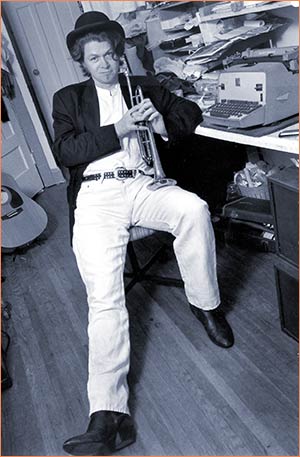| in Plain Text |
| Current features |
| Past articles |
| main features |
| spoken word: Book of Voices |
| poetry video: Videotheque |
| background: about e-poets |
| other features |
| network neighborhood |
| e-poets network partners |
| artist Heather Haley Vancouver, BC, Canada |
| Cinasphere Vallejo, California, USA |
| Poet in Residence Queensland, Australia |
| Farrago Poetry London, England |
|
artist Patrick Sanchez poet-at-large |
| e-poets network Chicago, Illinois, USA |
follow us  on Facebook on Facebook |
Red Primer review: Robert Priest
part 2 of Fortner Anderson's review of the Red Primer Poetry Festival
On the first night of the event, we moved from French poems, songs and stories of Quebec poet-novelist Genevieve Letarte to the performance work Derek Dawda of the Ottawa slam team with the public appreciative of each. Robert Priest ended the evening with his poems, aphorisms and songs.
Robert Priest hails from Toronto, a poet with 15 collections in print and several cdís. He was known as "Dr. Poetry" in a recent CBC radio series on the spoken-word. His is a "passionate, cocky alternately adoring and insulting verse", according to the Toronto Star. He has fashioned a keen ironic voice, biting and droll. In one memorable piece, read on the first night of the festival, he constructed a conceit where an all-powerful Saddam Hussien demands that the United States remand Elvis Presley to Iraq.
|
Priest gives us a trenchant exposition of the absurd that has engulfed our lives. He recalls the lies that led us into the current war and for an instant allows us to see the stupefying discourse of power. It is all the more effective because it is done with such a mean ironic voice.
The Athenian Greeks held that irony in discourse was contemptible because it stained the clarity of truth. The circumlocution of irony resembled the lie and most Athenians wanted no part of it. Socrates was accused of using this mode and the men of Athens, tired after their long war, condemned him for it.
The use of the ironic voice places the poet in an awkward and difficult place. This discourse is only successful if the public addressed can read through the overt message to catch and share its underlying intent. In this poem, Priest does not propose that Elvis Presley constituted a "weapon of mass distraction", nor that he was a threat to the people of Iraq. Rather, Priest is making a comment on the official and mendacious discourse of the United States that supported the case for war in Iraq. That discourse was as false, Priest wants us to recognize, as the claim that Elvis Presley was a danger to Iraq culture.
Itís funny because we are all in on the joke, we believe that Saddamís claim in the poem is patently ridiculous. As ridiculous Colin Powell shaking a vial of chalk dust while fabulating a tale of mobile anthrax laboratories cruising the Baghdad-Falluja by-way.
If, however, the reader does not already accept the premise that the official discourse was a lie, the piece doesnít make sense. What kind of madman would attack rockín roll? On other levels the reader must also accept that there is no truth to the claim that Elvis Presley and by extension Western culture is no threat to non-Western culture.
The poet using an ironic voice preaches to the converted. His and the poem must be blunt and broad enough to excite the shared assumptions and prejudices which are necessary to correctly decode the piece. This adds enormously to the difficulty of writing the poem.
Priestís poem "WMD", a poem built up by creating new meanings for the abbreviation of the "Weapons of Mass Destruction", suffers from the weight of this double discourse. As Priest works through alternate meanings of the abbreviation he posits "Why More Death", "Wild Manís Denials" etc. It is funny, for moments, but too repetitive and facile to present us an understanding of the full horror of our societal capacity to accept both the existence of such weapons and the lies of power that feed our fears of them.
Priest has written several collections of poems for children and he presented his poem "Bully, Bully", the story of a schoolyard bully who is faced in-turn by a more menacing bully-bully. This bully-bully is then surprised by an even larger bully-bully-bully and so on. Here in a voice without irony, Priest succeeds. His performance of the piece was spot-on as he gave voice to the whipsaw of the bully's transformation from belligerence to obsequiousness.
| e-poets.net copyright © 1999-2016 e-poets network all rights reserved get in touch with us | tech info | legal | founder |



